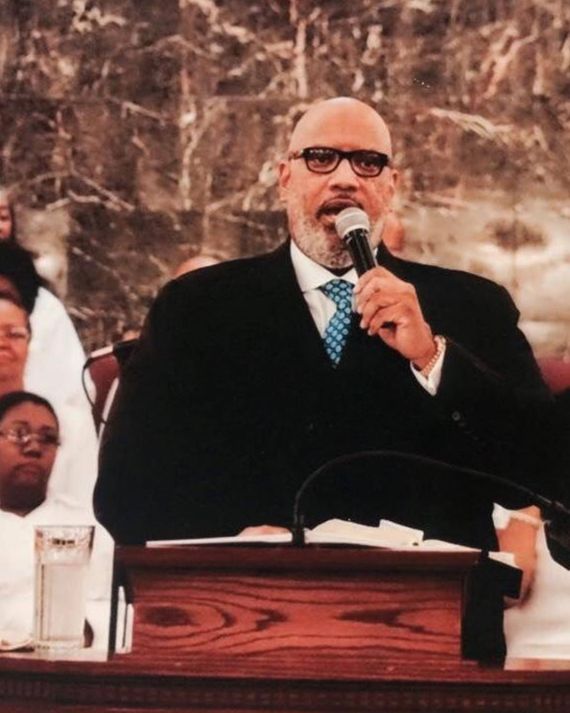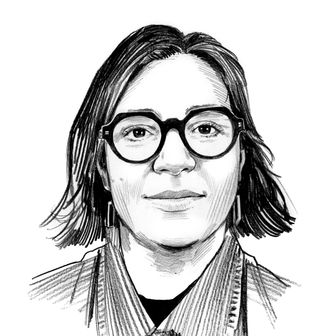
This article was featured in One Great Story, New York’s reading recommendation newsletter. Sign up here to get it nightly.
On Palm Sunday, the Reverend Dr. Johnnie Green put on a black suit, hung a silver cross around his neck, and sat at his dining-room table. The past few weeks had been the most difficult of his 40 years in the ministry. He’d lost seven members of his congregation, six to COVID-19. Twenty had tested positive. Fifteen miles from the New Jersey home where he was quarantined with his wife and one of his two sons, his church, Mount Neboh Baptist in Harlem, was empty. Sitting before his computer, he welcomed worshippers to a Facebook Live service. “We can’t thank God enough for sparing our lives,” he said, smiling broadly at the camera. “I’m thankful to be alive. I don’t know about anybody else, but I’m thankful the Lord has spared our lives another day. It’s another day’s journey, and I’m glad about it, and you ought to be glad about it.”
It was his third Sunday leading a virtual service. Some 400 worshippers joined him live, and another 1,500 watched the service later in the day. As he sang “Amazing Grace” in his rich baritone, comments accumulated in the sidebar. “Singing with you,” one congregant wrote. “Sinngggg pastor green” wrote another. Green read Psalm 46 (“God is our refuge and strength, a very present help in trouble”) and bowed his head in prayer. “We’re not able to gather at our physical church,” he said. “But Lord, we know that the church is not a building. We are the church.”
Mount Neboh Baptist Church was established in 1937 at the home of a Harlem minister and his wife. Today, it has some 1,200 members and occupies a former synagogue fronted by Ionic columns on Adam Clayton Powell Jr. Boulevard. Green, 57, a onetime high-school quarterback from Dallas with a burly physique and an air of gravitas, began ministering when he was 15 years old. He has served as Mount Neboh’s pastor since 2006, guiding its congregation, which is predominantly black and working class, through an era of gentrification that has seen Harlem fundamentally transformed. “The black church has always helped the black community navigate turbulent waters and turbulent times,” Green told me the day after his Palm Sunday service. “It has always been a refuge and a bastion of hope.”
Now, confined to his home, he is guiding his followers through their most trying time yet. Every morning, he goes online to lead the community in worship and share news about congregants who have fallen ill or died. He makes himself available by phone, day or night, to pray with members and try to lift their spirits. “I want to deliver hope but not false hope,” he said on a video call, a silver-and-blue tracksuit zipped up to his chin, his eyes somber behind rimless glasses. “When I’m told a person who tested positive in the hospital has double pneumonia, I tell families, ‘We may not know the outcome, but we believe whether we live or whether we die, we are with the Lord. So therefore we still win.’ I don’t tell them, ‘If you pray hard enough, your loved one will come out of it.’ ”
Early data from cities and states around the country, including New York, has shown that black people are suffering from the coronavirus at an exceptional rate. Green doesn’t find the numbers surprising. “There’s a saying, ‘When white America catches a cold, black America gets pneumonia,’ ” he said. Based on what he’s been reading and on conversations he’s had with fellow pastors, he believes his congregation has been hit harder than most in the city.
He doesn’t know where or how each of his sick congregants contracted COVID-19, but he suspects a number of them may have gotten it at church. In the first week of March, one of Green’s friends and colleagues, the Reverend Torrence Robinson, celebrated his 35th anniversary as a pastor at the Gethsemane Baptist Church in the Bronx. Each night that week, in a tribute to Robinson, a different pastor preached there. According to Green, every one of them got sick. “And one died,” he added after a long pause, referring to his friend Rev. Isaac Graham, the pastor of Macedonia Baptist Church of Harlem. When Green spoke at Gethsemane Baptist on Wednesday, March 4, he was not yet worried about contracting the virus. The disease still seemed like something that was affecting people far away. Three days later, he learned that one of his parishioners, a deacon in her early 70s named Shirley Miller, had fallen ill. (Although a number of his congregants had gone to Gethsemane Baptist to see him preach, she had not been among them.) Now she was in the hospital, where she had tested positive for COVID-19. “I was shocked,” Green said. “Just last weekend, she had assisted with her grandchildren’s baptism. It came upon her suddenly.”
The next day, he presided over his usual Sunday service at Mount Neboh. The theme was “Quitting Is Not an Option!” Looking back, he wonders if concerns about the coronavirus were already lurking in the back of his mind. “The sermon was meant to encourage the congregation never to give up, no matter what we have to go through,” he said. After he spoke, he didn’t stay to give the benediction. He went straight to his office in the church, where he realized he was drenched in sweat. He drove home and got into bed. Green never got tested and made a full recovery, but he had many of the symptoms of coronavirus: a fever, dry cough, difficulty breathing. The morning after he fell ill, two more of his congregants tested positive. A week later, they began to die.
The first was Cathy Williams, one of his ministers in training. She’d been in church on Sunday, March 8, and began to feel unwell the following day. She died a week later at 65. Green was in disbelief. “I just didn’t anticipate her passing,” he said. “I thought she was going to the hospital. I thought they would administer medication, put her on a ventilator if necessary, and she would get better.” A week after that, Green got a call from Miller’s son. She too had passed away. Two days later, Green learned he’d lost a third member, Ruthann Cohen–Aikens, who was 64. She and Green were especially close. “She was a friend and confidant,” he said. It was at this point, he recalled, he “began to feel a sense of being overwhelmed.” As he wrestled with unspeakable loss, his congregants were looking to him for guidance. “I’m not advocating abandoning my role,” he said, “but for the first time since the outbreak, I felt a sense of helplessness. Not hopelessness but helplessness.” At this, Green averted his face from the camera, shut his eyes, and pressed his hand to his mouth. A tear slid down his cheek. “I do apologize,” he said. After a moment, he regained his composure. “For 40 years, I’ve been walking in and out of hospitals,” he said. “For 40 years, I’ve been able to offer comfort to families and to help in the transitioning of their loved ones. Now all I can do is tell them that I’ll mask up and glove up and meet you all at the cemetery.”
Sandra Baker, Mount Neboh’s executive pastor, who is responsible for the day-to-day operation of the church’s ministry, appreciated that Green had been open with the congregation about the pain he’s been feeling. “We’re seeing his heart,” she said. “When he’s on Facebook and he breaks down, we have to give him a moment. Everyone’s in the comments, saying, ‘We love you. We’re with you, pastor.’ ” She called him last week after her aunt was hospitalized. “I had an opportunity to say, ‘It’s hurtful to know you can’t be with your loved one,’ ” she said. “It was painful for me, but he listened.” She found solace in knowing he could relate. “It’s like Jesus saying, ‘I know what you’ve been through,’ ” she said. “ ‘I know the suffering.’ ”
The coming weeks will be tough for Green. Since we first spoke another member of the congregation had died. And then there are the burials to plan. With so many dying in the city, the logistics are more difficult than usual, but he knows at some point soon, he’ll put on a suit, tie, and protective attire and make a trip to Rosemount Memorial Park Cemetery in Elizabeth, New Jersey, to bury Cohen-Aikens. To keep from falling apart, he has been fasting and praying. “In that moment when I need to cry,” he said, “I’ll get in my car or go in the backyard.” Sometimes he pictures himself as an empty pitcher. “After I have poured out into everyone else,” he explained, “I need pouring into.” Talking to his colleagues from around the city and the country has helped, and he plans to seek professional counseling after this is over. “I’m sure after time has elapsed and I’m showing up every Sunday and the people who used to be there are no longer there, it will hit me hard,” he said.
As Easter Sunday approached, Green was busy preparing his sermon. Like pastors all around the world, he would log on to Facebook to lead his congregation in commemorating the resurrection of Jesus. At his Palm Sunday service, he reminded his parishioners that Jesus would be coming back to resurrect them, too. “On that day when Gabriel blows his horn,” he exclaimed, Jesus is “gonna break through the clouds.” Leaning back, he raised his hands to the ceiling and cried “Hallelujah,” and although his house was silent, you could imagine the blasts of the organ, the stomping of feet and clapping of hands, the chorus of amens that would have normally reverberated through Mount Neboh Baptist Church. “The graves that contain every believer,” he continued, his voice growing louder, “the graves that contain all of our loved ones who died in Christ, those graves are gonna open up, and the deceased in those graves are going to get their glorified bodies.” He adjusted the cross around his neck and leaned into the camera, that resolute smile returning to his face. “Listen, that’s good news for us at Mount Neboh,” he said. “Yes, we lost Shirley, but on that day, Shirley’s gonna be raised up. We lost Cathy Williams. We lost Ruthann.” One after the other, he recited the names of the dead. “We’ve lost seven members,” he said. “But guess what? ‘Blessed are the dead which dieth in the Lord henceforth. Yea, saith the spirit, they shall rest from their labors, and their works will follow them.’ And on that great morning, because we praise Him as King, because we praise Him as miracle worker, and because we praise Him as Christ the Anointed Savior, listen, we too will go home to be with the Lord.”
*A version of this article appears in the April 13, 2020, issue of New York Magazine. Subscribe Now!






























